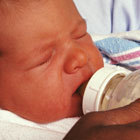GPs are failing to identify mental health councerns in four-in-ten women experiencing them at their six-week postnatal check up, a charity has claimed.
A survey carried out by NCT found that 20% of new mothers were not asked about their emotional wellbeing, despite this being a NICE recommendation.
But NCT said it was unsurprising that the opportunity to identify emotional problems was being missed amid the pressure GPs are facing.
The charity therefore recommends that more funding is made available for the six-week check to allow GPs more time with new mothers.
Sarah McMullen, NCT head of knowledge, said: ‘A third of women said their six-week check was rushed and for some, it lasted only three minutes.
‘GPs are under incredible pressure so it’s no wonder that this crucial opportunity to uncover any mental health problems is being missed.’
But RCGP chair Professor Helen Stokes-Lampard said: ‘What isn’t helpful is using indiscriminate surveys as a stick with which to beat hard working GPs… when we are doing our very best for patients under such intense resource and workforce pressures.
‘It’s actually very encouraging that nearly 80% of new mothers were asked about their emotional wellbeing at the six-week check – but perinatal mental health conditions are incredibly complex, and in many cases we have no choice but to rely on women to disclose their problems.’
NCT also called for better GP training in maternal mental health, but the RCGP said GPs are well-versed and just need longer consultation times.
Professor Stokes-Lampard said: ‘GPs are highly trained to have confidential, non-judgmental conversations about all health issues, including mental wellbeing, and any concerns they share with us will be taken seriously.
‘Perinatal mental health is a clinical priority for the College, and we have developed a whole range of resources to support GPs and our teams to deliver the best possible mental health care for our patients during and after pregnancy’.
Pulse October survey
Take our July 2025 survey to potentially win £1.000 worth of tokens












